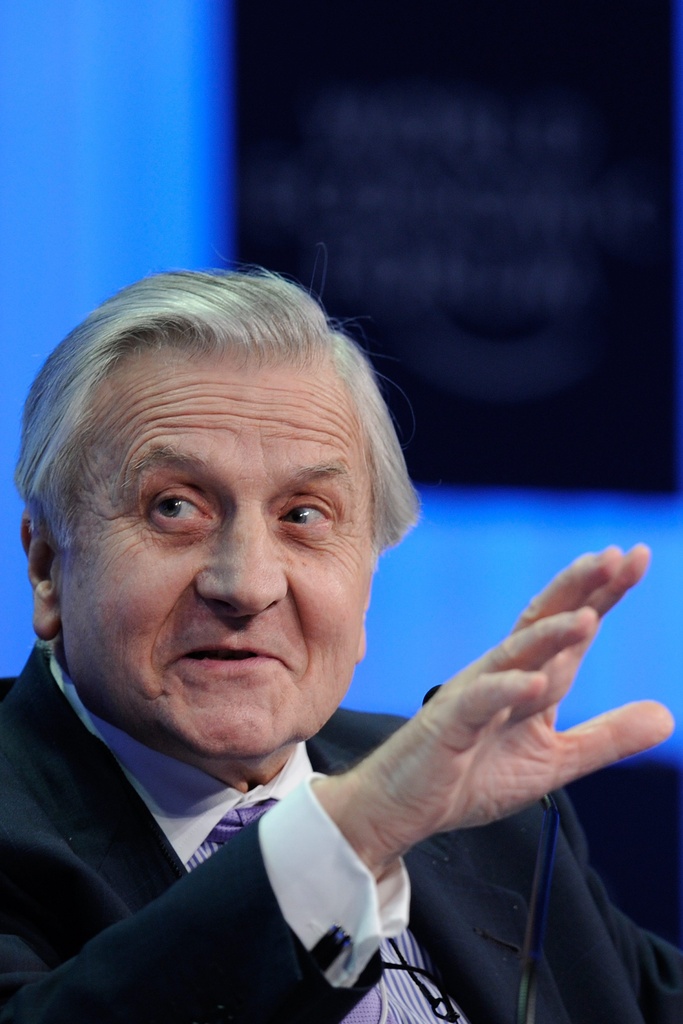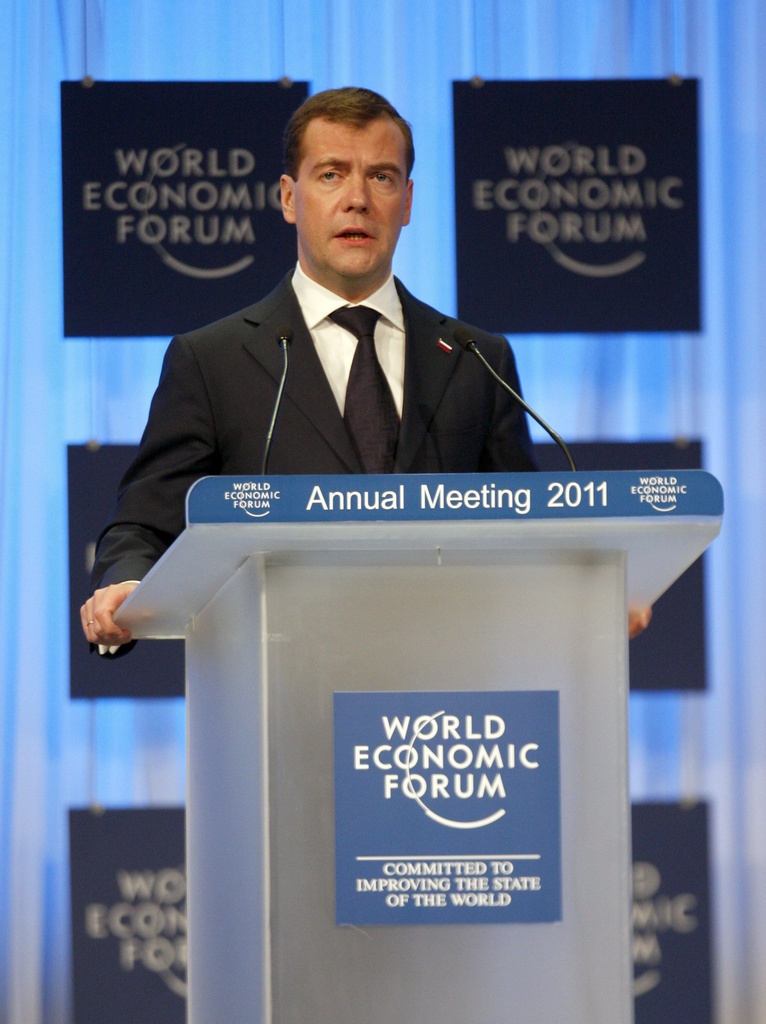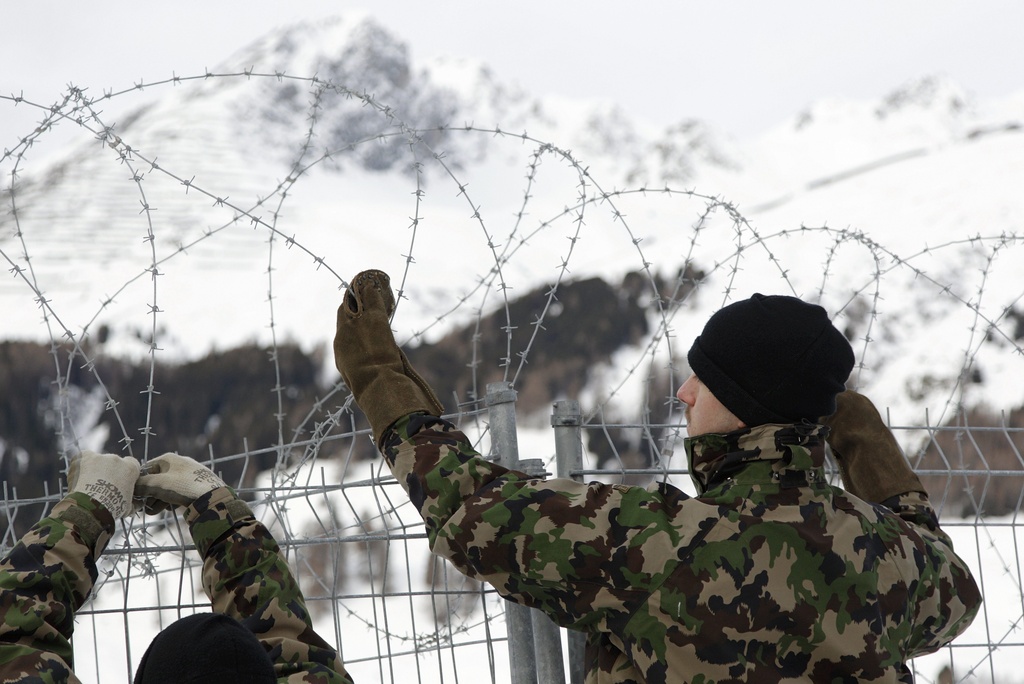Currency crisis is in the eye of the beholder

Is the euro doomed or is the crisis – if it even exists – limited to isolated countries? Some of the world’s top economists gathered in Davos for a candid debate.
swissinfo.ch squeezed into the packed school assembly hall at the 41st World Economic Forum (WEF) annual meeting, but left none the wiser.
Sharp elbows were needed to get a seat next to the army of television cameras and it was striking how many of the audience – of what after all was only a side event – were wearing WEF badges.
The theme was “Euro Grounding?” and the quality of guests on the podium didn’t get much higher: next to Jean-Claude Trichet, president of the European Central Bank, was Nouriel Roubini, professor of economics at New York University’s Stern School of Business and famous for being one of the few to predict the financial crisis.
Also on stage was Patrick Odier, chairman of the Swiss Bankers Association and senior partner of a Swiss private bank, Wilhelm Hankel, professor for currency and development policy at the Goethe university in Frankfurt, and Dimitris Papalexopoulos, owner of a Greek cement company.
The only woman was the moderator, Swiss news presenter Susanne Wille, who pointed out that Papalexopoulos was one of the few Greeks who wasn’t doing badly after his country’s debt crisis sent the euro into its downward spiral last year.
“No currency crisis!”
No sooner had the first question been put to the panellists – what’s needed to stabilise the euro? – and they were already disagreeing.
Hankel wondered why the euro should even be stabilised, preferring to see it binned.
“Europe exists without the euro, as we saw for 40 years,” he said, adding that every country had to look after its own economy and that countries such as Greece should leave the euro zone, joining the other EU countries that weren’t part of the currency union.
Trichet completely disagreed. “There is no euro currency crisis – that is absolutely clear,” he declared.
Isolated countries had problems, he conceded, but these didn’t affect the euro as a currency but rather those who hadn’t stuck to the rules created in 2004-2005.
“The European Central Bank isn’t responsible for the economy, individual countries are,” he said.
Odier agreed that there wasn’t a euro crisis per se, it was more a question of separate fires breaking out in different countries.
Hard work
Roubini, whose utterances change stock exchanges, according to Wille, remained rather non-committal, saying the economy had to be stabilised and jobs had to be created.
But Hankel wasn’t letting them pull the wool over his eyes. “Two-thirds of euro countries are bankrupt or nearly bankrupt,” he said.
For Trichet, the only solution to the euro crisis or crisis among individual countries was “hard work – and lots of it”. He left open what exactly that meant.
Swiss model
It wasn’t until the debate turned to Switzerland that the panellists found common ground.
Trichet said Switzerland had a strong economy, low unemployment and a strong currency. It had weathered the financial crisis well, he added, and was achieving results as before.
Papalexopoulos didn’t seem surprised. “Switzerland has had stable institutions, good education and a strong economy for decades,” he said. “It would survive in any environment.”
The audience wasn’t so optimistic, at least not those who didn’t take an international perspective. People asked questions about speculation and what they considered were futile foreign currency purchases made by the Swiss National Bank (SNB) – a view that not even Patrick Odier disputed.
The SNB had announced earlier in mid-January that it had made a loss in 2009 of SFr26 billion ($27.5 billion) on its foreign currency positions.
Trichet had to leave before the end of the debate, leaving an empty seat and unanswered questions. Some of the audience did the same, climbing over outstretched legs, bags and jackets.
So is there a euro crisis? Definitely maybe.
French President Nicolas Sarkozy vowed on Thursday that he and European partners would “never turn our backs on the euro”, giving an extra boost to the rebounding currency by calling it a linchpin of peace and prosperity – despite the debt crises worrying investors and leaders worldwide.
Sarkozy said the continent’s hopes lay in the common currency, shared by 17 countries.
“The disappearance of the euro would be so cataclysmic that we can’t even possibly entertain the idea,” Sarkozy said.
He acknowledged months of worries about the euro’s survival since the European Union and International Monetary Fund had to bail out debt-laden Greece and then Ireland last year. But despite those concerns, he said, “the euro is still there.”
“Europe has had 60 years of peace and therefore we will never let the euro go or be destroyed. … I speak as much for my German friends as I do for the French,” he said.
Sarkozy’s comments helped support the already-buoyant euro. Following his remarks, Europe’s single currency ran up to a fresh two-month high of $1.3759. The euro has advanced nearly ten cents in a little over two weeks amid mounting signs that EU policymakers have honed their crisis management skills and support for the currency from China and Japan.
The World Economic Forum started life as the European Management Forum in 1971.
Formed by German-born businessman Professor Klaus Schwab, it was designed to connect European business leaders to their counterparts in the United States to find ways of boosting connections and solving problems.
It is a non-profit organisation with headquarters in Geneva and is funded by the varying subscription fees of its members.
The 2011 Davos meeting takes place from January 26 to 30 and will attract 2,500 delegates from 90 countries.
(Adapted from German by Thomas Stephens)

In compliance with the JTI standards
More: SWI swissinfo.ch certified by the Journalism Trust Initiative













You can find an overview of ongoing debates with our journalists here . Please join us!
If you want to start a conversation about a topic raised in this article or want to report factual errors, email us at english@swissinfo.ch.